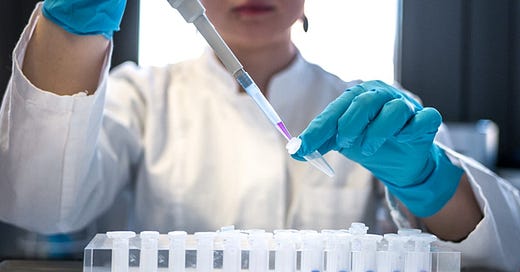Ten years ago, Jennifer Doudna and Emmanuelle Charpentier discovered the CRISPR-cas9 tool that allowed precise genome engineering – and earned them the 2020 Nobel Prize. This has been one of the most important – and publicized – examples of the new biotech age we find ourselves in. But this is only the beginning.
What the future holds in biotech is still uncertain, but it’s clear that we now possess the tools and technologies to make dramatic changes and advancements with biotechnology. In The Genesis Machine: Our Quest to Rewrite Life in the Age of Synthetic Biology, Amy Webb and Andrew Hessel provide a high-level overview of biotech’s origins, current landscape, and musings on the future potential of biotech by century’s end.
Biotech as we know it is an outcome of rapid scientific advancement in the biological sciences across the 20th century. As Webb and Hessel share throughout each chapter, biotech’s humble origins include the discovery and synthetic production of insulin, discovery of the structure of DNA, and the multi-billion-dollar human genome project. As technology advanced, so did our applications and tinkering of biology.
In 2018 a rogue Chinese scientist used CRISPR technology to edit human embryos, crossing an ethics line that the biotech community thought far premature of our technology and scientific understanding. Although by some measures we may feel we are slipping into a Gattaca future already, the field and its impact are still in its infancy.
There are several problems we need to address before we pull full steam ahead into the biological age, including a public relations barrier (people are fearful of tinkering with biology; see the perception issues of genetically modified organisms, or GMOs), a labyrinth of ethics, and building the supporting technology and infrastructure economy to support biotech. Progress is moving fast, but what might the future look like?
Webb and Hessel explore possible futures by injecting some creative writing into a popular science book – a relative rarity. The final section of their book includes five creative scenarios to foreshadow what we might expect. This includes genetic screening and selection a la Gattaca, artificial wombs, true anti-aging technology, and artificial living environments a la Elon Musk’s vision of sustainable living on Mars.
The Genesis Machine was a superbly interesting book. It was a high-level overview rather than a deep dive which keeps it accessible. I also learned some new details about previous topics such as the public-private competition of the human genome project in the late 1990s – 2000s. Would recommend for those interested in what biotech is.
Published: February 2022
Format: Hardcover
If you think this sounds interesting, bookmark these other great reads:
Crispr People: The Science and Ethics of Editing Humans by Henry Greely (2021)
The Age of Living Machines: How Biology Will Build the Next Technology Revolution by Susan Hockfield (2019)
This post contains affiliate links, allowing me to earn a small commission when you purchase books from the link provided. There is no cost to you, and this will allow me to keep this newsletter free and open to all. Happy reading!





